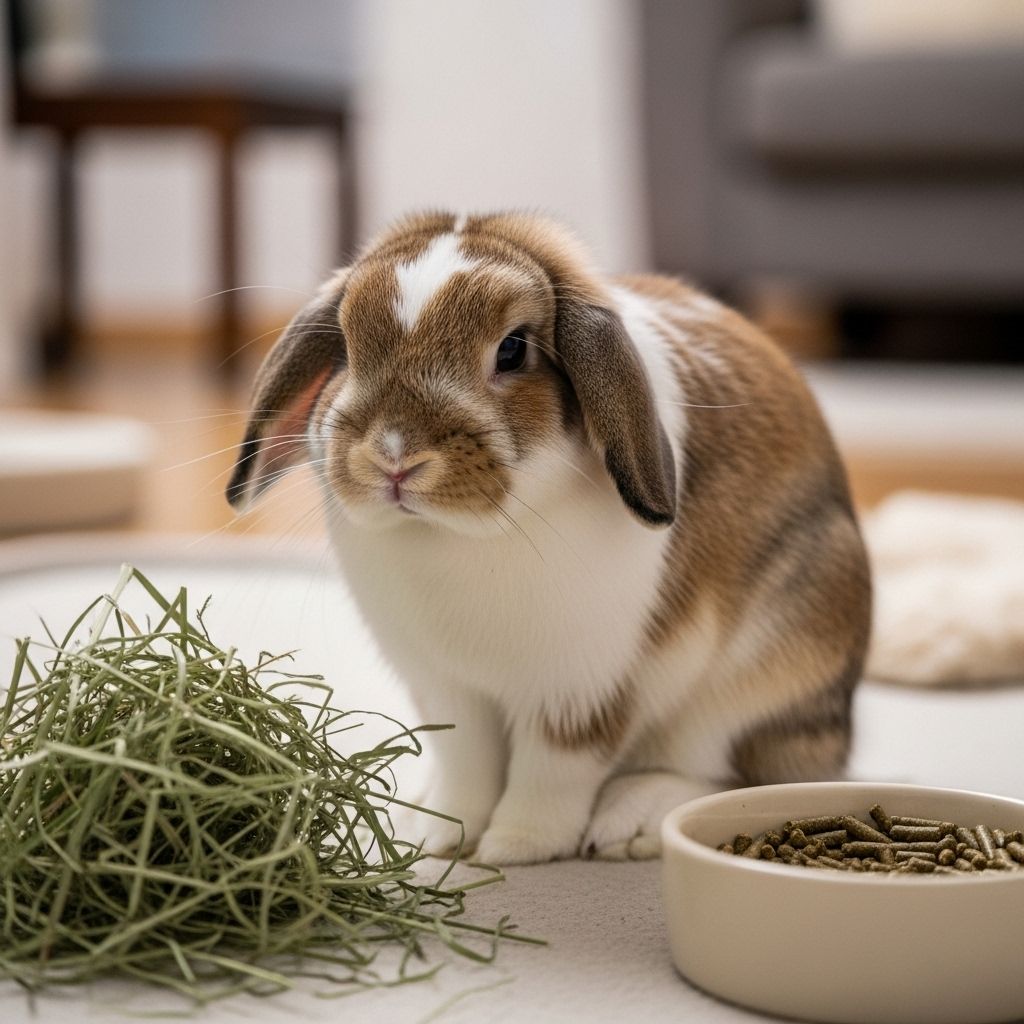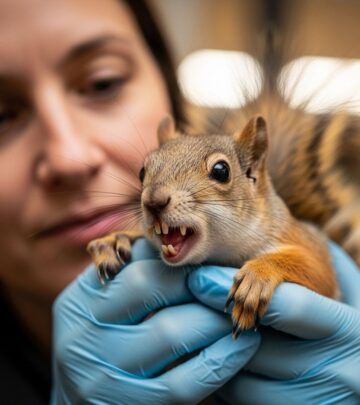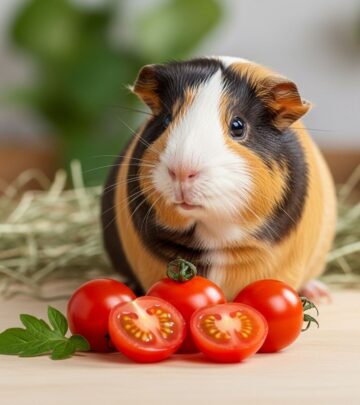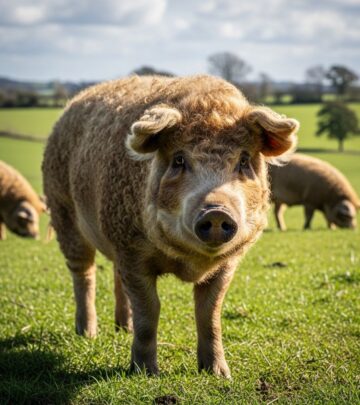Why Is My Pet Rabbit Not Eating? Causes, Urgency, and What to Do
Recognizing early digestive distress can be the difference between crisis and recovery.

Why Is My Pet Rabbit Not Eating?
Rabbits thrive on routine: a steady supply of fresh hay, greens, and predictable surroundings. When a rabbit turns down its food, pet owners should act quickly. A rabbit not eating is not merely a sign of pickiness—it can be a dangerous and sometimes life-threatening situation. This article covers the most common causes for appetite loss in rabbits, red-flag symptoms, and step-by-step advice on what every responsible owner must do when facing this urgent scenario.
How Serious Is a Rabbit Not Eating?
Loss of appetite in rabbits—even for a few hours—is a cause for immediate concern. Unlike some other pets, rabbits have a sensitive digestive system that requires constant movement of food through their gut. When this process stops, it leads to painful and often fatal conditions within a short timeframe.
- Up to 4-6 hours: Experts consider this a medical emergency. If a rabbit misses even one meal or stops nibbling for several hours, prompt veterinary attention is needed.
(References: ) - Beyond 12 hours: The situation is dire; the risk of irreversible damage or death increases dramatically.
Why Is Immediate Action Essential?
- Rabbits rapidly develop Gastrointestinal Stasis (GI Stasis) when not eating, a fatal condition where digestion halts and toxins build up.
- Their bodies cannot vomit, clear hairballs, or compensate for digestive blockages the way cats or dogs might.
Core Medical Causes for Appetite Loss in Rabbits
Understanding why your rabbit has stopped eating can help you and your veterinarian act swiftly and effectively.
1. Gastrointestinal Stasis (GI Stasis): The Silent Emergency
GI Stasis is the most urgent, common, and dangerous cause of appetite loss in rabbits. It occurs when their digestive tract either slows down drastically or stops entirely. Without food passing through, gut bacteria become imbalanced, releasing painful gas and toxins.
- Key signs of GI Stasis:
- Sudden refusal to eat hay, pellets, treats, or greens
- Drastic reduction or absence of fecal pellets
- Lethargy, hunched posture, half-closed eyes
- Audible tooth grinding (indicating pain)
- Abdomen feels bloated or is unusually silent
Taking preventive measures is vital in pet care. For a thorough understanding of regular maintenance and health tips for your rabbit, visit our Ultimate Rabbit Care Guide. This resource is packed with insights that can help you avert serious health issues. - GI Stasis can progress to life-threatening dehydration, liver damage, or sepsis within hours if not rapidly addressed.
2. Dental Problems
Rabbits’ teeth grow continuously throughout life, requiring constant grinding from coarse foods like hay. Without proper wear, teeth develop sharp points or overgrow, causing mouth ulcers, abscesses, and extreme pain when chewing.
- Signs of dental pain:
- Drooling or wet fur around the mouth
- Selective eating or dropping food
- Face rubbing or pawing at the mouth
- Weight loss and unkempt fur
Similarly, understanding the feeding habits and possible issues with other pets is essential. Discover the signs that your cat may be facing appetite loss in our insightful article on how long cats can go without food for essential owner advice. - Dental examinations should be routine for all rabbits, particularly if appetite decreases or drooling develops.
3. Hairball Obstruction
Unlike cats, rabbits cannot vomit. They swallow fur during grooming, which must move through their system normally. A low-fiber diet puts rabbits at high risk of developing hairball blockages that stop digestion.
- Prevention: Daily brushing, especially during heavy molting, plus unlimited access to quality hay.
- If a blockage forms, surgical intervention may be required, but prevention is far safer.
4. Pain or Illness
Any underlying health problem—arthritis, injury, infection, dental abscesses, kidney or liver disease, parasites—can make eating difficult. Sometimes, appetite loss is the first warning sign a rabbit is in discomfort.
- Additional symptoms: Rapid or labored breathing, wounds, limping, or unusual swelling may also appear.
5. Environmental and Emotional Stress
Rabbits are sensitive and prone to anxiety. Any sudden environmental change can suppress their appetite, including:
- New pets or people in the house
- Loud noises (construction, fireworks, storms)
- Travel or cage relocation
- Sudden changes in food, water supply, or living conditions
Chronic stress may also lead to long-term digestive disorders.
6. Inappropriate Diet
Feeding too many pellets, treats, or high-carb foods—and not enough hay—can slow the rabbit’s digestion, fostering unhealthy bacteria. An unbalanced diet is a frequent cause of appetite loss and stasis in pet rabbits.
- Ensure hay comprises at least 85-90% of your rabbit’s diet; limit pellets and sweet treats.
Warning Signs to Watch For
Besides not eating, rabbits often display subtle indicators of pain or illness. Recognizing these signs early can make the difference between successful treatment and tragedy.
- Smaller, fewer, or misshapen droppings: A clear signal the gut is slowing down or blocked.
- Lethargy: Sitting still, hiding, or showing little response to interaction.
- Hunched posture, teeth grinding, or hiding: All indicate your rabbit is in significant discomfort.
- Bloating or a tense abdomen: Signs of gas pain or dangerous digestive shutdown.
- Reduced water intake: Can quickly worsen dehydration and gut stasis.
- Rapid breathing or low body temperature: These severe symptoms call for emergency vet care.
When Should You Be Alarmed?
Owners sometimes speak of the “12-hour rule,” but best practice is to treat any refusal to eat for 3-4 hours as a potential emergency. If you notice any of the red-flag signs above, do not wait—your rabbit’s life may depend on rapid veterinary intervention.
What to Do If Your Rabbit Stops Eating
Time is of the essence when your rabbit won’t eat. Follow these urgent steps:
- Contact Your Veterinarian Immediately
Loss of appetite in rabbits is almost always a medical emergency. Contact a vet specializing in exotic animals right away. - Do Not Attempt Home Remedies Without Guidance
Don’t try syringe feeding, over-the-counter meds, or home treatments unless explicitly told to by your vet. The wrong approach can delay life-saving care or cause further harm. - Monitor Feces and Behavior
Track the size, number, and consistency of droppings. Take note of mobility, signs of pain, and any changes in water or food intake. - Minimize Stress Immediately
Keep the environment quiet, reduce handling, and eliminate loud noises or disruptive changes. Allow your rabbit a familiar safe space while you prepare for veterinary care. - Don’t Delay Professional Help
If your regular vet is unavailable, locate an emergency animal hospital. Be prepared to describe all your rabbit’s symptoms and changes.
How Veterinarians Diagnose and Treat Appetite Loss in Rabbits
Veterinary diagnosis starts with a full examination and sometimes bloodwork, x-rays, dental evaluation, and fecal checks for parasites or infection. The treatment will vary depending on the cause:
- For GI Stasis:
- Hydration therapy (IV or subcutaneous fluids) to combat dehydration
- Pain management to relieve abdominal discomfort
- Medications to stimulate gut movement (prokinetics)
- Syringe feeding with critical care formulas if safe and advised by the veterinarian
- For Dental Disorders:
- Teeth trim, filing, or extraction under anesthesia
- Treatment for mouth ulcers or abscesses
- For Hairball Obstruction:
- Supportive care, and rarely, surgery in severe cases
- Treat Underlying Illnesses: Antibiotics, anti-inflammatories, and other therapies as determined by diagnostics.
How to Prevent Appetite Loss in Rabbits
Prevention is the best cure. Keep your rabbit healthy and reduce the risk of emergencies with these strategies:
- Provide unlimited access to fresh, high-fiber hay (Timothy, orchard, or meadow hay).
- Feed only small quantities of fortified pellets (if at all) and keep calorie-dense treats rare.
- Offer fresh greens and vegetables, adjusting gradually to any dietary changes.
- Regularly brush your rabbit, especially during shedding seasons, to prevent hair ingestion.
- Schedule routine veterinary checkups, including dental evaluations.
- Keep your rabbit’s habitat clean, calm, and free of potential stressors.
- Observe daily for changes in appetite, stool output, or energy level—and act on warning signs immediately.
Frequently Asked Questions (FAQs)
Q: How long can a rabbit go without eating before it’s an emergency?
A: Rabbits should never go more than 3–6 hours without eating. If your rabbit refuses food for over four hours, call your veterinarian immediately.
Q: What are the first signs of GI stasis in rabbits?
A: Look for refusal to eat even favorite foods, fewer or smaller droppings, lethargy, bloating, and a hunched or withdrawn posture. Audible tooth grinding indicates pain and distress.
Q: Can I syringe feed my rabbit at home if it’s not eating?
A: Never attempt syringe feeding or home remedies without explicit veterinary direction. Improper feeding can worsen certain conditions or cause choking.
Q: What should my rabbit’s daily diet look like to prevent appetite loss?
A: The foundation should always be unlimited fresh hay, supplemented with a variety of leafy greens and very limited pellets or treats. Clean water should always be available.
Q: If my rabbit stops eating after a stressful event, will it recover on its own?
A: Even if stress triggers appetite loss, rabbits can quickly spiral into GI stasis. Always monitor closely and contact your vet at the first sign of reduced eating or stool output.
Critical Takeaways for Rabbit Owners
- Any rabbit that stops eating—even for a few hours—faces a medical emergency.
- GI Stasis is a leading and rapidly fatal risk. Know the signs and act at the first hint of trouble.
- Always consult a veterinarian immediately for loss of appetite—self-treatment can delay real help.
- Prevention through proper diet, dental care, grooming, and a stable environment is key to long-term rabbit health.
Table: At-a-Glance Reasons and Actions for Rabbits Not Eating
| Possible Cause | Key Signs | Action to Take |
|---|---|---|
| GI Stasis | Refusal to eat, few or no droppings, lethargy, bloating, pain | Call vet urgently; do not wait |
| Dental Disease | Drooling, dropping food, pawing at mouth, weight loss | Schedule dental exam and treatment |
| Hairball Blockage | No droppings, history of heavy molting, possible distension | Emergency veterinary attention |
| Pain or Illness | Lethargy, abnormal posture, respiratory symptoms, wounds | Veterinary workup to identify cause |
| Environmental Stress | Reduced eating after changes, hiding, anxiety | Ensure calm setting, monitor closely, contact vet if not eating resumes promptly |
| Dietary Imbalance | Decline over time in appetite, irregular stools | Revise diet to increase hay, decrease pellets and treats, observe for recovery |
When in Doubt, Act Fast
Pet rabbits are precious companions, but their instincts for hiding illness mean that by the time lost appetite is visible, urgent action is often needed. Immediate veterinary care can save lives. With preventative care and prompt recognition of the dangers, rabbits can enjoy long, healthy lives—and so can their devoted owners.
References
- https://www.rabbitholehay.com/blogs/rabbit-hole-hay-blog/help-my-rabbit-doesnt-eat-cause-for-concern
- https://keystoneah.com/blog/rabbit-is-not-eating/
- https://veteris.co.uk/petcare-advice/rabbit-not-eating
- https://sandiegorabbits.org/education/is-your-rabbit-sick
- https://www.vets-now.com/pet-care-advice/rabbit-gut-stasis/
- https://www.bluecross.org.uk/advice/rabbit/health-and-injuries/basic-healthcare-in-rabbits
- https://www.veterinaryemergencygroup.com/post/rabbit-trouble-my-bunny-stopped-eating
- https://www.petmd.com/rabbit/conditions/digestive/c_rb_weight_loss
Read full bio of Sneha Tete












